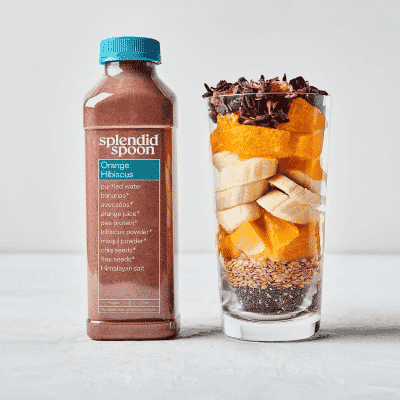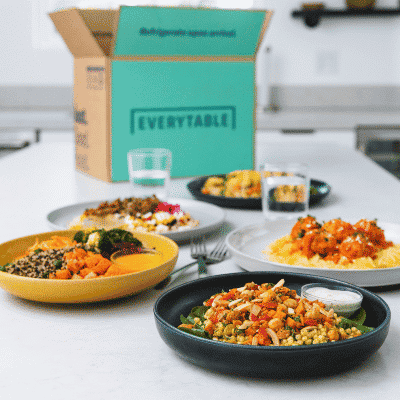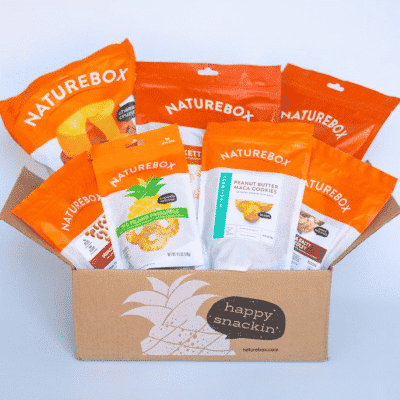

Micheile Henderson / Unsplash
For those looking for a quick and convenient way to eat delicious, hearty meals with little to no hassle, there are plenty of meal kit delivery services to choose from. But out of all of the brands available, which is the best meal delivery service for the environment? We review the top eco-friendly meal kit services and discuss what makes a meal delivery service sustainable.
We’ve all seen the overwhelming number of meal kits promoted online, but many consumers are left wondering if these delivery services are really worth the purchase. Despite all the hype, these programs can be beneficial for a number of reasons, including their environmental impact, which you can read more about below our reviews.
Each kit comes with pre-portioned packets of produce, meat, or fish if requested, and all of the spices and seasonings you need to complete a chef-inspired dish at home. We’ve reviewed several leading meal kit delivery brands like Sunbasket, Freshly, and Purple Carrot, plus the best vegetarian meal delivery services, that promote their eco-friendly approach. Here is our list of the best eco-friendly meal delivery services.
Our Picks for the Top Meal Kits
Each product featured here has been independently selected by the writer. You can learn more about our review methodology here. If you make a purchase using the links included, we may earn commission.
- Best Overall – Sunbasket
- Best Plant-Based – Purple Carrot
- Best Keto & Paleo – Snap Kitchen
- Best “No-Cooking” – Splendid Spoon
- Best for Giving Back – Everytable
- Best for Snacks – Nature Box
- Best for Desserts – Love + Chew
How We Reviewed Meal Delivery Services for Sustainability
To create our list, we looked at each meal kit delivery service based on their food options, ingredient sourcing, packaging, and customer reviews to find the services we think are best for the conscious consumer.
- Dietary options – For the actual meals we considered both the quality and variety of the recipes and whether they offered vegan, gluten-free, and dairy-free options.
- Ingredients – We then examined how they sourced their ingredients, whether they were organic, non-GMO, and locally grown. We looked for important eco-friendly labels from authorities like the USDA, Non-GMO Project, and the Marine Stewardship Council.
- Packaging – An important component of our review was also the packaging for each meal, how much was recyclable or biodegradable, and whether the brand used recycled materials in their packaging.
- Customer reviews – Finally, we looked at customer reviews to see what users liked or didn’t like about each service.
Our Opinion of Each Meal Delivery Kit
Prices shown are starting price per serving/meal unless otherwise noted.
Best Overall: Sunbasket

sunbasket.com
Sunbasket is our favorite organic meal kit brand. Sun Basket delivers a box of 100% organic produce, antibiotic- and hormone-free meat, and farm-fresh eggs. Their approach to sourcing wild seafood was named Best Choice or Good Alternative by the Monterey Bay Aquarium Seafood Watch® Program.
Why buy: Sun Basket aims to support farmers who push for sustainable water management and crop rotations, as well as ranchers and fisherman who treat the planet with respect. Read our full Sunbasket review to learn more about the brand’s sustainability efforts.
Best Plant-Based: Purple Carrot

purplecarrot.com
Purple Carrot offers all plant-based meal kits in a variety of tasty menu items. There’s even a black bean burger if you want to prepare the vegan-skeptic member of your family a familiar plate. They make eating more plant-based meals easy and delicious.
Why buy: Purple Carrot meal kits, in many ways, support the idea that many small, smart choices can add up to a big impact. According to researchers, you could cut the carbon footprint of your diet by 60% by eating plant-based meals for two-thirds of your diet.
Best for Keto & Paleo: Snap Kitchen

snapkitchen.com
Snap Kitchen is all about delivering clean, delicious, and sustainably-sourced meals that are ready to eat at affordable prices. They craft a variety of keto-friendly, paleo, low-carb, and Whole 30 meals that make it easy for people with busy schedules to eat healthier.
Why buy: We like that Snap Kitchen offers so many different dietary options for their prepared meals. Plus, their food is always free from hormones, preservatives, antibiotics, gluten, and artificial sweeteners.
Best “No Cooking”: Splendid Spoon

splendidspoon.com
Splendid Spoon offers plant-based smoothies, grain bowls, soups, and noodle bowls that are ready-to-eat and made with real ingredients. Their smoothies are a great option for when you are on the go, and the grain bowls, soups, and noodle dishes can help you add hearty, plant-based meals to your routine.
Why buy: We love that Splendid Spoon offers so many different plant-based meal options, especially for those who don’t like to cook. Plus, they have a real commitment to sustainability, and their packaging is 100% recyclable.
Best for Giving Back: Everytable

everytable.com
Everytable is a meal delivery service with a purpose. Their goal is to help make nutritious, delicious, chef-prepared meals available to everyone in order to help build a more just food system. They offer a huge variety of hot plates, salads, wraps, snacks, breakfast foods, and more.
Why buy: We love that Everytable is committed to making good food available to underserved communities at fast food prices. These ready-to-eat meals offer a delicious way to do good in the community. The only drawback is that they are only available in Los Angeles at the moment.
Best for Snacks: NatureBox

naturebox.com
NatureBox is all about creating healthier snack options that taste great and are actually good for you. Their snacks are made without high fructose corn syrup, hydrogenated oils, MSG, and contain less than 10 grams of sugar per serving. You can order specific snack products or get boxes that contain a variety of delicious snack options.
Why buy: We like NatureBox because they make it easy to enjoy healthier snacks at home or at the office. Choose from foods like popcorn, cookies, dried fruit, chips, crackers, nuts, jerky, and breakfast items like oatmeals. The price shown is for one box.
Best for Desserts: Love + Chew

loveandchew.com
The superfood cookies from Love + Chew are so much more than a sweet treat. They include 7 grams of protein and are made with clean label ingredients like almonds, real fruit, chia seeds, Fair Trade dark chocolate chips, and sea salt. Enjoy eating a dessert that’s good for you with these vegan and gluten-free super cookies.
Why buy: We love that Love + Chew superfood cookies pack so much good stuff into each delicious cookie. You can join the Cookie Club to get regular deliveries of your favorites. The brand is also AAPI/Women-owned and donates a portion of all profits to Oasis for Girls, a San Francisco-based nonprofit for young girls. The price shown is for one box.
Are Meal Kits Really Sustainable?
Whether meal kits are really sustainable depends on how you define sustainability. While they produce more waste, they have lower greenhouse gas emissions and result in less food waste compared to grocery store meals.
Food waste is the largest category of waste going into landfills in the U.S. The average American generates more than 200 pounds of waste each year, according to the USDA.
Both a 2017 study out of the University of Texas at Austin and a 2019 study published in the journal Resources, Conservation and Recycling found that meal kits are more sustainable than purchasing ingredients from a grocery store for the following reasons:
- On average, meal kits produce 33% lower greenhouse gas emissions than grocery store meals.
- The pre-portioned ingredients in meal kits lead to less food loss and waste.
- Meal kits have lower last-mile transportation emissions than grocery store meals.
- The ice packs used in meal kit packages present an average emissions decrease versus retail refrigeration.
Now, if you plan your meals out each week, use all of the ingredients you intend to, compost what you don’t use, and buy locally from a farmers market or other community shop, meal kits will likely be a step backward in terms of your food-related sustainability.
The studies also mentioned that meal kits produce more packaging waste than grocery store meals — UT Austin estimated an average of 3.7 more pounds of packaging material per meal. Because meal kits come in cardboard boxes and ship ingredients in small packages (for example, if you need a tablespoon of pine nuts for your recipe, they’ll likely come pre-portioned a small plastic sleeve), there’s much more plastic waste produced. One study found that “disposable packaging can represent over 50% of per-meal energy use for meal-kits.”
Some of these items can be repurposed, such as the tiny glass jars that spices and condiments come in, which can be used for travel, crafting, or storing small objects. Others can be washed and recycled, depending on your local recycling guidelines. But most of the waste will end up in a landfill.
So, it’s up to you whether you think the pros of lower carbon emissions outweigh the cons of more plastic waste.
Getting Started with a Meal Delivery Service
With so much variety, selecting a meal delivery service can turn into a stressful endeavor. Additionally, brands like Hello Fresh, Blue Apron, Home Chef, and Daily Harvest are options that might try to win you over, but they may not have as sustainable methods as some of the options listed above.
Although, the sheer number of meal kit options can also work to your advantage. These companies are competing for customers and often offer sign-up specials and discounts to get you started. When shopping for a subscription service, try multiple options, and take advantage of these deals. With many programs, you have the freedom to change or cancel your subscription, so you can try a few different options to find one that fits your taste and your budget. We also recommend that you compare your per-meal cost to what you might spend on dinners at the grocery store to maximize your savings.
If you give one of these meal kits a try, let us know what you think. We’ll update this list regularly as we get feedback from readers and add additional sustainability notes as we dive deeper into new services.
Melena Gurganus is passionate health and wellness and her writing aims to help others find products they can trust. Her work has been featured in publications such as Health, Shape, Huffington Post, Cannabis Business Times, and Bustle.
- A Sustainable Meal Kit: Our Take On Sun Basket - EcoWatch
- Purple Carrot Eco-Friendly Plant-Based Meal Kit Review - EcoWatch
- 6 Best Vegetarian Meal Kits and Why You Should Try Them - EcoWatch
- Are Meal Kits Better or Worse for the Environment? - EcoWatch
- Best Produce Delivery Services for Fresh Veggies and Fruits
- 44% of Ocean Plastics Are Linked to Takeout Food
- Could ‘Upcycling’ Turn Food Waste Into Your Next Meal?
- 10 Best Healthy Vegetarian Snack Ideas Plus The Best Brands
- 9 Ways to Be an Eco-Friendlier Grocery Shopper
- The Best Vegan Snack Ideas and Brands for 2021
- 43 Out of 50 Top U.S. Fast-Food Chains Lack Vegan Options, Report Finds - EcoWatch

 233k
233k  41k
41k  Subscribe
Subscribe 